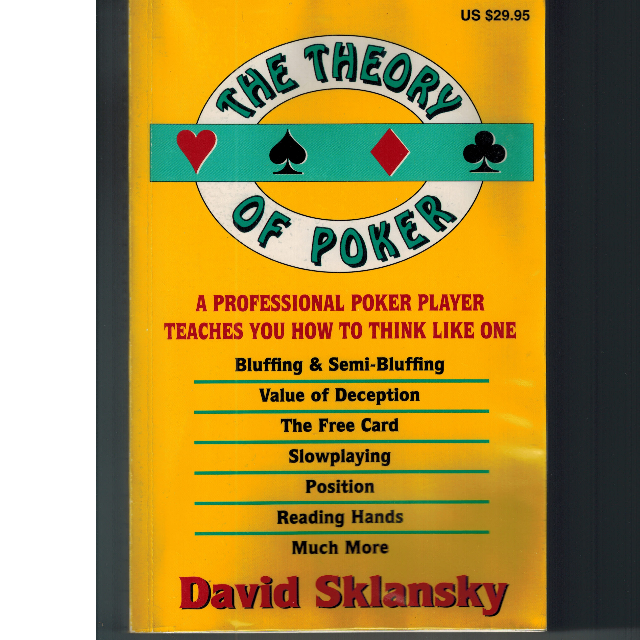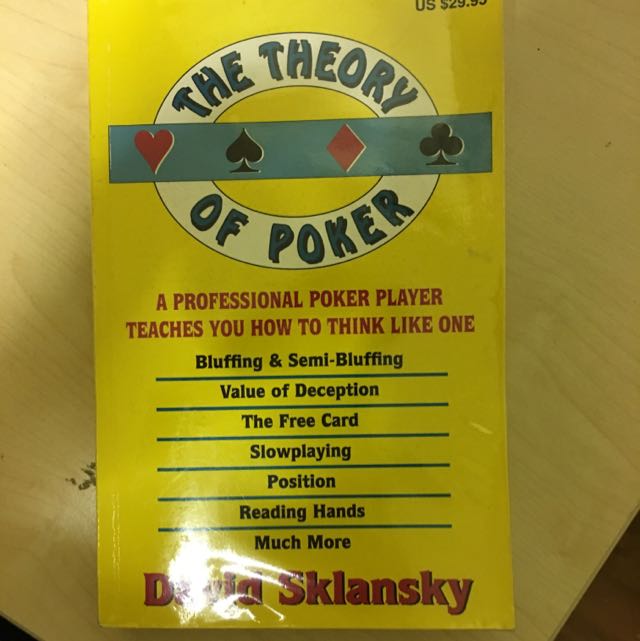cesquihebes1973.netlify.com
The Theory Of Poker
This book introduces you to the Fundamental Theorem of Poker, its implications, and how it should affect your play. Other chapters discuss the value of deception, bluffing, raising, the slow-play, the value of position, psychology, heads-up play, game theory, implied odds, the free card, and semibluffing. Discusses theories and concepts applicable to nearly every variation of the game, including five-card draw (high), seven-card stud, hold ’em, lowball draw, and razz (seven-card lowball stud). This book introduces you to the Fundamental Theorem of Poker, its implications, and how it should affect your play.
Next:Poker is a popular card game that combines elements of chance and strategy. There are various styles of poker, all of which share an objective of presenting the least probable or highest-scoring hand. A poker hand is usually a configuration of five cards depending on the variant, either held entirely by a player or drawn partly from a number of shared, community cards. Poker Discusses theories and concepts applicable to nearly every variation of the game, including five-card draw (high), seven-card stud, hold 'em, lowball draw, and razz (seven-card lowball stud). This book introduces you to the Fundamental Theorem of Poker, its implications, and how it should affect your play. The Theory of Poker by David Sklansky discusses theories and concepts applicable to nearly every variation of the game, including five-card draw (high), seven-card stud, hold em, lowball draw, and razz (seven-card lowball stud). This book introduces you to the Fundamental Theorem of Poker, its implications, and how it should affect your play.
``Hold'em Poker for Up: Classic Books on Previous:
Previous: Classic Books on
Classic Books on ``The Theory of Poker'
Probably the single most important book ever written on poker is ``TheTheory of Poker' by David Sklansky [87]. Written in 1987, itwas the first book to correctly identify many of the underlying strategicprinciples of poker. These concepts are illustrated with examples fromTexas Hold'em, Seven-Card-Stud, Five-Card-Draw, Seven-Card-Lowball, andLowball-Draw, but they are equally applicable to all variations of poker.
Poker Books Pdf
While it is beyond the scope of this essay to present a complete overviewof poker theory, a few examples of essential concepts will be given forcontext. First, after explaining the nature of mathematical expectation,Sklansky states the overriding principle of the game, which he calls ``TheFundamental Theorem of Poker'.
Sklansky's Fundamental Theorem of Poker:Every time you play a hand differently from the way you would have played it if you could see all your opponents' cards, they gain; and every time you play your hand the same way you would have played it if you could see all their cards, they lose. Conversely, every time opponents play their hands differently from the way they would have if they could see all your cards, you gain; and every time they play their hands the same way they would have played if they could see all your cards, you lose.
The Fundamental Theorem is stated in common language, but has a precisemathematical interpretation. The expected value of each decision madeduring an actual game can be compared to the expectation of the correctdecision, based on perfect information. Each player's long termexpectation is determined precisely by the relative frequency and severityof these ``misplays'. On average, a player who makes fewer misplays thanher opponents will be a winning player. The theorem may appear to statethe obvious, but has many subtle implications to poker strategy, some ofwhich are illustrated in the text.
Other fundamental concepts introduced in this book include ``odds' (potodds, effective odds, implied odds and reverse implied odds), the value ofdeception, the danger of the free card, the semi-bluff, and the importanceof position. Each of these notions can be encorporated into a theoreticalframework for understanding the game, and could prove to be substantialstrengths for a computer algorithm.
Issues of practical importance are also addressed in the book, such asreading hands, understanding the psychology of poker, and evaluating theprofitability of a game. While these topics may be of a less theoreticalnature, they are among the many abilities required for play at the highestlevels. It is unclear to what degree a computer algorithm can excel atthese ``human' aspects of the game, or whether it is even necessary toattain world class strength.
The Theory Of Poker Book
Note that this classic book does not attempt to give a step-by-stepprocedure for playing each game, but instead teaches the player how tothink correctly about each situation that may arise. This requiresconsiderable effort on the part of the student, but once the principlesare fully understood, they are much more reliable, and can be applied toany form of poker, regardless of the particular characteristics or gameconditions.
Sklansky also includes a chapter on game theory, as it applies to bluffingand calling. This is done largely for the sake of completeness, and toshow that he is aware of such views. He then goes on to explain some ofthe limitations of such a system, and justifies the more pragmaticapproach to bluffing, described in a separate chapter.
Next: ``Hold'em Poker for Up: Classic Books on Previous: Classic Books on & Schaeffer
Thu Feb 12 14:00:05 MST 1998
The Theory of Poker by David Sklansky is a how-to book. It is written for poker players who understand the basics of the games, but need to perfect their knowledge and playing strategies. This book will teach the player to think like a professional. The book will instruct the player about what is and isn't important in poker playing and will help the player to understand the logic that is involved in playing poker games. What should you do in a particular situation? Every poker player wonders about this at times. David Sklansky's book will help the player understand what factors to consider in various situations. The book looks at the theory and concepts involved in games of poker that help the player ascertain what the best play in various game situations is. These theories and concepts are evident in every kind of poker game.
This book does offer rules for the player. It does not teach the player how to play poker. The Theory of Poker is not a book for beginners and will not teach the newbie player the rules of the games. The book teaches the player how to think in the various situations which a poker player will encounter. Sklansky doesn't give the players a list of rules to follow. Memorization is not the way to play poker. He does present the rules of the game in the Appendix for new players, so newbies can benefit from reading the book. But the book is basically intended for those who know the rules and have some experience playing the various games.

This doesn't mean that the new player can't benefit from the book. The new player can learn the rules of the game from the Appendix and then incorporate the rest of the book into the learning process. The new player will learn to think like a pro right away instead of developing bad habits and will learn the correct approaches to different hands and different situations right after learning the rules of the games. This is a book about game theory and how to apply the concepts to poker. Sklansky teaches the player how to view the different situations in terms of game theory and how to determine the best play in the situation.
Since poker is such a popular game now, many people will find this kind of book interesting. It takes a little longer to learn to play the way Sklansky suggests, but it is worth the time. It is better to learn the proper approach instead of just trying to memorize rules.
David Sklansky is considered to be one of the top authorities on poker playing in the world. He has written various books and other documents as well as led seminars for poker players. He has also given seminars at the World Series of Poker. He earns a portion of his income from gambling, so he has to be successful at what he does.